

Langage de la pensée. Un article de Wikipédia, l'encyclopédie libre.
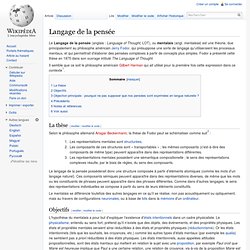
Le Langage de la pensée (anglais : Language of Thought, LOT), ou mentalais (angl. mentalese) est une théorie, due principalement au philosophe américain Jerry Fodor, qui présuppose une sorte de langage qu'utiliseraient les processus mentaux, et qui permettrait d'élaborer des pensées complexes à partir de concepts plus simples. Fodor a présenté cette thèse en 1975 dans son ouvrage intitulé The Language of Thought. Il semble que ce soit le philosophe américain Gilbert Harman qui ait utilisé pour la première fois cette expression dans ce contexte[1]. Language of thought hypothesis. In philosophy of mind, the language of thought hypothesis (LOTH) put forward by American philosopher Jerry Fodor describes thoughts as represented in a "language" (sometimes known as mentalese) that allows complex thoughts to be built up by combining simpler thoughts in various ways.
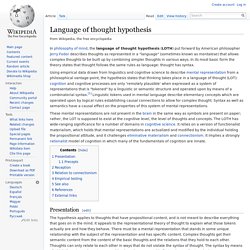
In its most basic form the theory states that thought follows the same rules as language: thought has syntax. These mental representations are not present in the brain in the same way as symbols are present on paper; rather, the LOT is supposed to exist at the cognitive level, the level of thoughts and concepts. The LOTH has wide-ranging significance for a number of domains in cognitive science. It relies on a version of functionalist materialism, which holds that mental representations are actualized and modified by the individual holding the propositional attitude, and it challenges eliminative materialism and connectionism. Presentation[edit] Precepts[edit] 1. 2. Reception[edit] Empirical testing[edit] Revealing the Language of Thought. The Language of Thought Hypothesis (Stanford Encyclopedia of Philosophy)
1.
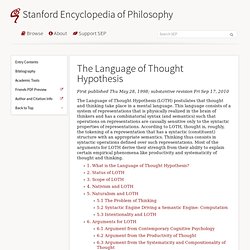
What is the Language of Thought Hypothesis? LOTH is an empirical thesis about the nature of thought and thinking. According to LOTH, thought and thinking are done in a mental language, i.e., in a symbolic system physically realized in the brain of the relevant organisms. In formulating LOTH, philosophers have in mind primarily the variety of thoughts known as ‘propositional attitudes’. Propositional attitudes are the thoughts described by such sentence forms as ‘S believes that P’, ‘S hopes that P’, ‘S desires that P’, etc., where ‘S’ refers to the subject of the attitude, ‘P’ is any sentence, and ‘that P’ refers to the proposition that is the object of the attitude. LOTH can now be formulated more exactly as a hypothesis about the nature of propositional attitudes and the way we entertain them. The Language of Thought: Entry.
In his (1975) Jerry Fodor offered a bold hypothesis: the medium of thought is an innate language that is distinct from all spoken languages and is semantically expressively complete.
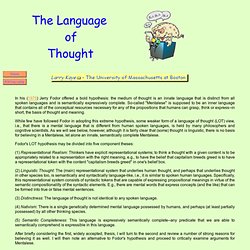
So-called "Mentalese" is supposed to be an inner language that contains all of the conceptual resources necessary for any of the propositions that humans can grasp, think or express--in short, the basis of thought and meaning. While few have followed Fodor in adopting this extreme hypothesis, some weaker form of a language of thought (LOT) view, i.e., that there is a mental language that is different from human spoken languages, is held by many philosophers and cognitive scientists. As we will see below, however, although it is fairly clear that (some) thought is linguistic, there is no basis for believing in a Mentalese, let alone an innate, semantically complete Mentalese.
The Language of Thought: Annotated Bibliography. Note: items marked (*) are mentioned in the tour, but they are not primarily concerned with the linguistic thought issue (some do not discuss it at all.)
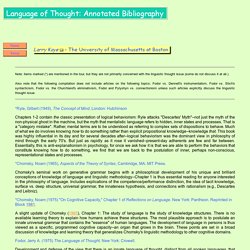
Also note that the following compilation does not include articles on the following topics: Fodor vs. Dennett's instrumentalism, Fodor vs. Language of Thought Hypothesis [Internet Encyclopedia of Philosophy] The language of thought hypothesis (LOTH) is the hypothesis that mental representation has a linguistic structure, or in other words, that thought takes place within a mental language.
![Language of Thought Hypothesis [Internet Encyclopedia of Philosophy]](http://cdn.pearltrees.com/s/pic/th/hypothesis-encyclopedia-90956797)
The hypothesis is sometimes expressed as the claim that thoughts are sentences in the head. It is one of a cluster of other hypotheses that together offer a theory of the nature of thought and thinking. The other hypotheses in the cluster include the causal-syntactic theory of mental processes (CSMP), and the representational theory of mind (RTM). The former is the hypothesis that mental processes are causal processes defined over the syntax of mental representations. The latter is the hypothesis that propositional attitudes are relations between subjects and mental representations. On Mentalese. (Originally appeared in Lognet 95/1) By Alan T.
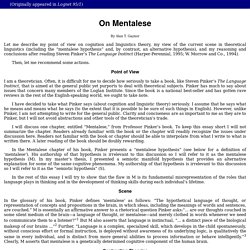
Lessons in Mentalese. CONCEPTS.
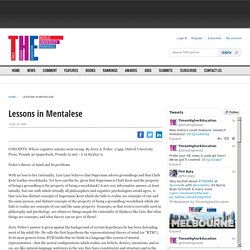
Where cognitive science went wrong. By Jerry A. Fodor. 174pp. Oxford University Press. Pounds 30 (paperback, Pounds 12.99). - 0 19 823637 9. Wittgenstein and Mentalese. Peut-on penser sans langage ? Le concept de « pensée » possède au moins deux acceptions majeures.
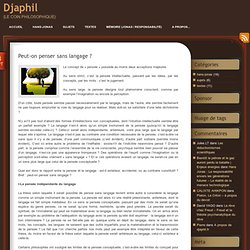
Au sens strict, c’est la pensée intellectuelle, passant par les idées, par les concepts, par les mots : c’est le jugement. Au sens large, la pensée désigne tout phénomène conscient, comme par exemple l’imagination ou encore la perception. D’un côté, toute pensée semble passer nécessairement par le langage, mais de l’autre, elle semble facilement ne pas toujours emprunter la voie du langage pour se réaliser. Mais doit-on se satisfaire d’une telle dichotomie ? N’y a-t’il pas tout d’abord des formes d’intellections non conceptuelles, dont l’intuition intellectuelle semble être un parfait exemple ?
Quel est donc le rapport entre la pensée et le langage : est-il extérieur, accidentel, ou au contraire constitutif ? EST-CE LA PENSEE QUI CREE LE LANGAGE OU LE LANGAGE QUI CREE LA PENSEE ? Steven Pinker and Rebecca Newberger Goldstein: The long reach of reason. La cognition humaine saisie par le langage : de la sémantique cognitive au médiationnisme. 1Si l’on en croit une opinion répandue chez les partisans de la sémantique cognitive, la seule « alternative » à l’objectivisme1 – et, par conséquent, la seule théorie cognitive possible – serait un expérientialisme de type mentaliste, celui-là même qu’ils défendent et illustrent dans leurs travaux.
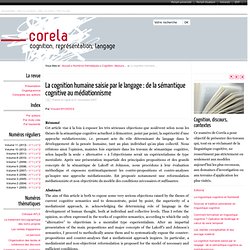
D’où il résulterait que toute contestation de la sémantique cognitive signerait un retour à l’objectivisme tant critiqué. Cette conviction repose manifestement sur le raisonnement suivant : les significations linguistiques ne peuvent être analysées adéquatement dans le cadre objectiviste parce qu’elles requièrent la compréhension humaine ; elles sont par conséquent de nature conceptuelle et doivent être analysées intégralement par référence à des mécanismes mentaux. 3Nous nous proposons deux objectifs complémentaires. 1.1. 10La sémantique cognitive se définit avant tout par son mentalisme. 1.2. 1.2.1. Logique de description. Un article de Wikipédia, l'encyclopédie libre.